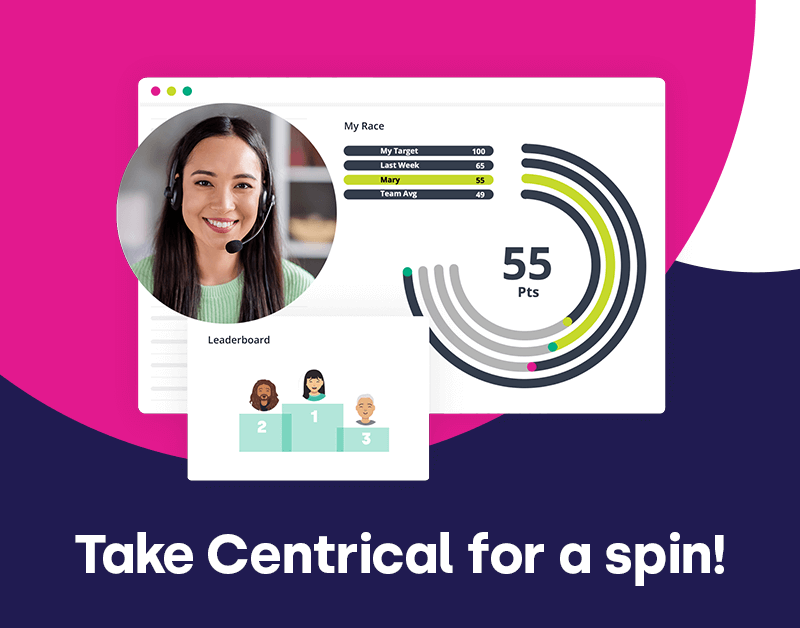Picture this: A customer calls in with a complex issue, looking for not just a solution but a reassuring voice on the other end of the line. Now, imagine a call center where every agent brings empathy, problem-solving, and efficiency. This kind of orchestration doesn’t happen by chance; it results from meticulous and strategic call center training.
And in the digital age, where instant gratification is the norm and customer expectations are ever-evolving, the importance of call center training cannot be overstated. It’s the secret sauce that transforms an ordinary interaction into an extraordinary one. From boosting agent performance to improving customer satisfaction, effective coaching sessions are the gateways to success.
What is Call Center Coaching?
At its core, call center coaching is all about improving the performance of your contact center agents. It involves regular one-on-one sessions, team training, and constructive feedback aimed at refining skills and boosting morale—and, ultimately, elevating the customer experience.
Why is Coaching Important in a Call Center?
Coaching is important in a call center to ensure that agents (the frontline in delivering exceptional service) are well-equipped to handle various customer interactions. Call center coaching bridges where the team is now, versus where they can be in terms of customer experience and agent productivity.
Call Center Coaching Areas You Should Focus On
When it comes to coaching call center agents, focus on these key areas:
Agent performance
Regularly assess and address individual agent performance with one-to-one feedback sessions to identify strengths and areas for improvement. Provide targeted training sessions to enhance skills crucial for effective customer interactions.
Customer satisfaction
Use coaching sessions to align agent behavior to improve customer satisfaction scores. Implement feedback loops to gather customer insights and incorporate them into coaching programs.
Real-time coaching
Supervisors should be able to easily monitor and intervene promptly while guiding agents in handling challenging situations. Leverage technology and AI-driven insights for real-time monitoring and feedback during and after customer interactions.
Engaging coaching techniques
Incorporate role-play scenarios in coaching sessions to simulate real customer interactions. Foster active listening skills to ensure agents understand customer needs and provide personalized solutions.
Navigating the Challenges of Good Call Center Coaching
Navigating the challenges of call center coaching is essential for unlocking your team’s true potential. Yes, there are hurdles, and time is a significant factor. Balancing coaching sessions with daily operations requires efficient scheduling and prioritizing based on performance metrics.
Constructive feedback is another hurdle, since agents may perceive negative feedback as criticism; the key here is framing feedback positively, highlighting growth opportunities, and acknowledging achievements. And adapting to diverse agent personalities can be tricky, but it’s crucial to tailor coaching techniques to suit individual learning styles and preferences. Overcoming these challenges is not just necessary; consider it the pathway to unleashing your team’s full capabilities.

Preparing for Call Center Coaching
To optimize the impact of your coaching efforts, start by defining clear objectives that align with broader organizational key performance indicators (KPIs), ensuring a strategic focus. Next, gather valuable insights by leveraging call recordings, speech analytics, and quality management tools to pinpoint relevant performance metrics.
Uncover patterns and trends within the data to tailor coaching strategies to the unique needs of each agent. Finally, translate these insights into actionable plans, complete with specific steps, milestones, and timeframes.
This meticulous approach not only streamlines the coaching process but also provides a structured framework to track and measure progress. By embracing this comprehensive preparation, you set the stage for productive and impactful call center coaching sessions that empower agents and contribute to overall organizational success.
6 Smart Strategies for Call Center Coaching
Effective call center coaching stars with a solid strategy. Here are a few popular practices:
- Role-playing scenarios Simulating real customer interactions through role-playing exercises is an especially effective coaching strategy. By replicating authentic scenarios, agents can practice their responses and fine-tune their communication skills. Immediate feedback allows for on-the-spot corrections, helping agents improve their handling of diverse customer situations.
- Active listening development Active listening skills are crucial in customer service. Training sessions can emphasize the importance of understanding customer needs, which aligns to address issues effectively. This approach helps agents become more attuned to customer concerns, improving satisfaction and issue resolution.
- Regular feedback sessions Consistent one-on-one coaching sessions provide a platform for ongoing improvement. Balancing constructive criticism with positive feedback is vital for maintaining agent morale. Acknowledging and celebrating achievements during these sessions not only motivates agents but also fosters a positive coaching environment, encouraging continuous development.
- Metrics-driven coaching Tailoring coaching sessions based on key performance indicators (KPIs) align coaching efforts with overarching business goals. By focusing on metrics such as first call resolution (FCR) and average handle time, coaching becomes more targeted and directly impacts customer satisfaction. This data-driven approach ensures that coaching efforts address areas with the most significant impact.
- Self-assessment tools Integrating self-assessment tools empowers agents to reflect on their own performance. Tip: Encourage agents to identify areas for improvement and contribute to their development plans to foster a sense of ownership. This aligns with a growth mindset, where agents actively engage in their own professional development and take responsibility for their success.
- Integrating automation Leveraging automation for routine tasks frees up time for coaching sessions. Utilizing AI-powered tools for data analysis and trend identification helps efficiently identify areas for improvement. This integration makes coaching more effective by allowing a more focused approach to addressing specific agent needs.
How to Measure the Impact of Call Center Coaching
Comprehensively measure the success of call center coaching initiatives by employing a dual approach of quantitative and qualitative metrics. First, scrutinize customer satisfaction scores (CSAT) to discern changes post-coaching and link improvements to specific coaching interventions. Second, delve into agent productivity metrics, including average handle time, first call resolution, and agent adherence, to gauge the direct influence of coaching on key performance indicators.
Finally, keep a close eye on retention rates, using them as a barometer for the effectiveness of coaching programs. A successful coaching regimen should contribute to heightened employee engagement, job satisfaction, and ultimately, improved retention rates. This holistic evaluation ensures a nuanced understanding of the impact of call center coaching, guiding future strategies for enhanced performance and customer satisfaction.
Common Call Center Coaching Tools to Consider
Customer feedback integration Integrate direct customer feedback into coaching sessions so agents know what to do more of and less of. Share positive customer testimonials and use them as motivation for improvement.
Personalized learning paths Today’s frontline agents want more than a paycheck – they want personal and professional growth. Create personalized learning paths for employees to help guide their growth as they progress to the next level.
Get a coaching copilot Supervisors can spend 60% of their day performing admin tasks. When you couple this with meetings and other tasks, there is often little time left for coaching. Leverage AI-powered software that sends automated coaching actions and helps supervisors prioritize who to coach and when.
Performance improvement plans Develop personalized performance improvement plans for underperforming agents. Clearly outline steps for improvement and provide ongoing support. Incorporate AI-powered microlearning modules as part of this training. (In fact, if you notice there are common areas of low performance, quickly creating training materials has never been easier.)
Speech analytics software Analyze agent-customer interactions for key insights. Identify language patterns, customer sentiment, and areas for improvement.
Performance management platforms Utilize platforms for gamified performance management. Engage agents with interactive and motivating coaching experiences.
Call center software with integrations Invest in software that seamlessly integrates with other tools. Ensure a unified platform for monitoring, analysis, and coaching.
Meet Centrical – #1 Performance Management Gamification Platform
The Centrical platform helps leading companies across industries and the globe build strong call center coaching programs and managers; in turn, also building more motivated, engaged, and high-performing frontline teams. Centrical does this by leveraging advanced gamification and tying it to every aspect of the employee experience – including real-time performance management, QM processes, augmented coaching, AI-powered microlearning, and the voice of employee. Learn more by visiting our site and reading some of our case studies.
Summary and Key Takeaways
Call center coaching is the linchpin of engaging frontline teams and building the confidence, knowledge, and skills of a strong workforce. With the right strategies and tools, your call center’s coaching initiatives can drive incredible results. A few key takeaways:
- By focusing on key areas such as agent performance, customer satisfaction, and real-time coaching, you can elevate your contact center to new heights.
- Overcoming challenges, implementing best practices, and measuring the impact of coaching are crucial steps in ensuring sustained success.
- Consider investing in call center coaching tools such as AI Copilot for managers to help cut down on time spent on administrative tasks and prioritize who to coach
For over a decade, Centrical has partnered with organizations across industries and the globe to change the game when it comes to call center coaching. Watch our platform in action with a quick preview and request your personalized demo today!
Engage and motivate your frontline teams
Improve performance with an AI-powered digital coach
Deliver world class CX with dynamic, actionable quality evaluations
Boost performance with personalized, actionable goals
Nurture employee success with the power of AI
Listen and respond to your frontline, continuously
Drive productivity with performance-driven learning that sticks
Drive agent efficiency, deliver client results
Keep tech teams motivated and proficient on products and services while exceeding targets
Maintain compliance while building customer happiness and loyalty
Enlighten energy teams to boost engagement
Engage, develop, and retain your agents while driving better CX
Improve the employee experience for your reservations and service desk agents








 Madeleine Freind
Madeleine Freind
 Natalie Roth
Natalie Roth Linat Mart
Linat Mart












 Doron Neumann
Doron Neumann Gal Rimon
Gal Rimon Daphne Saragosti
Daphne Saragosti Ella Davidson
Ella Davidson Ariel Herman
Ariel Herman Ronen Botzer
Ronen Botzer